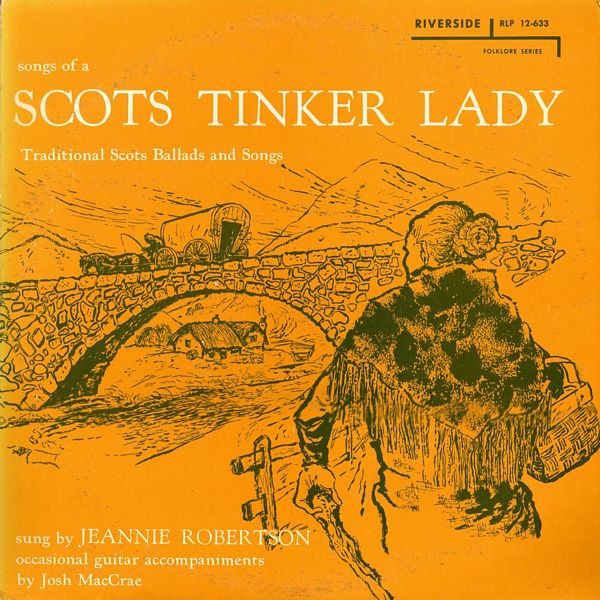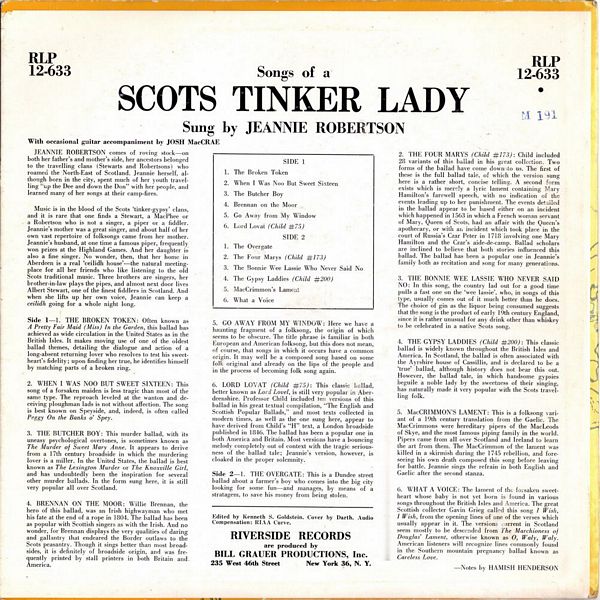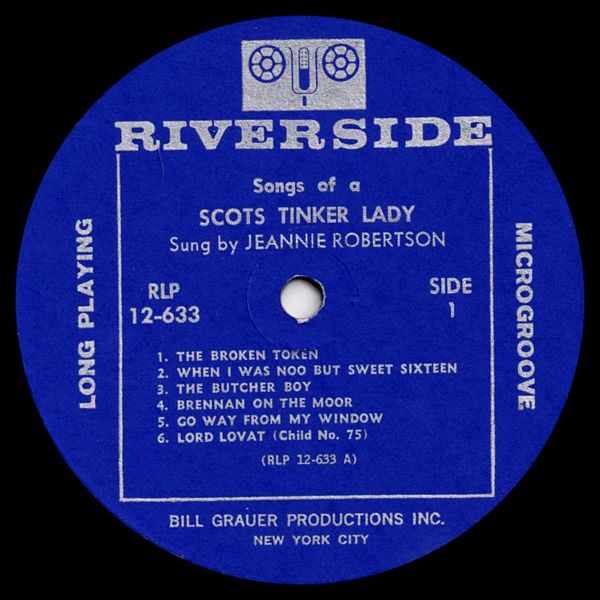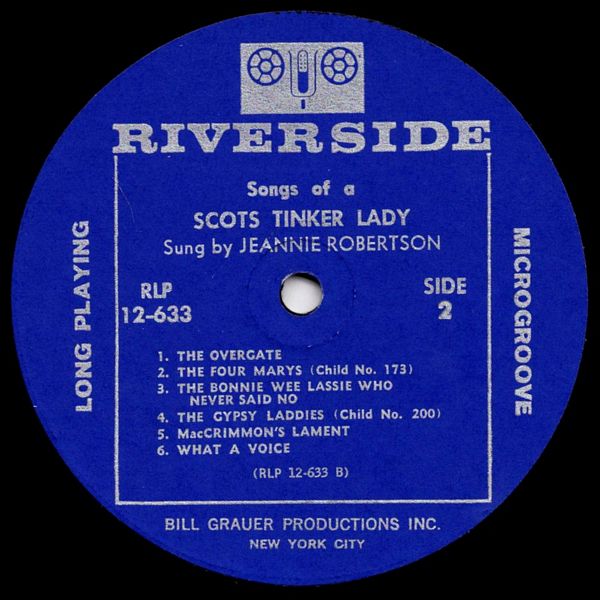
 |


 |
Sleeve Notes
JEANNIE ROBERTSON comes of roving stock-on both her father's and mother's side, her ancestors belonged to the travelling clans (Stewarts and Robertsons) who roamed the North-East of Scotland. Jeannie herself, although born in the city, spent much of her youth travelling "up the Dee and down the Don" with her people, and learned many of her songs at their camp-fires.
Music is in the blood of the Scots 'tinker-gypsy' clans, and it is rare that one finds a Stewart. a MacPhee or a Robertson who is not a singer, a piper or a fiddler. Jeannie's mother was a great singer, and about half of her own vast repertoire of folksongs came from her mother. Jeannie's husband, at one time a famous piper, frequently won prizes at the Highland Games. And her daughter is also a fine singer. No wonder, then, that her home in Aberdeen is a real 'ceilidh house' — the natural meeting-place for all her friends who like listening to the old Scots traditional music. Three brothers are singers, her brother-in-law plays the pipes, and almost next door lives Albert Stewart. one of the finest fiddlers in Scotland. And when she lifts up her own voice. Jeannie can keep a ceilidh going for a whole night long.
THE BROKEN TOKEN: Often known as A Pretty Fair Maid (Miss) In the Garden, this ballad has achieved as wide circulation in the United States as in the British Isles. It makes moving use of one of the oldest ballad themes, detailing the dialogue and action of a long-absent returning lover who resolves to test his sweetheart's fidelity; upon finding her true, he identifies himself by matching parts of a broken ring.
WHEN I WAS NOO BUT SWEET SIXTEEN: This song of a forsaken maiden is less tragic than most of the same type. The reproach leveled at the wanton and deceiving ploughman lads is not without affection. The song is best known on Speyside. and. indeed, is often called Peggy On the Banks o' Spey.
THE BUTCHER BOY: This murder ballad, with its uneasy psychological overtones, is sometimes known as The Murder of Sweet Mary Anne. It appears to derive from a 17th century broadside in which the murdering lover is a miller. In the United States, the ballad is best known as The Lexington Murder or The Knoxville Girl. and has undoubtedly been the inspiration for several other murder ballads. In the form sung here, it is still very popular all over Scotland.
BRENNAN ON THE MOOR: Willie Brennan. the hero of this ballad, was an Irish highwayman who met his fate at the end of a rope in 1804. The ballad has been as popular with Scottish singers as with the Irish. And no wonder, for Brennan displays the very qualities of daring and gallantry that endeared the Border outlaws to the Scots peasantry. Though it sings better than most broadsides, it is definitely of broadside origin, and was frequently printed by stall printers in both Britain and, America.
GO AWAY FROM MY WINDOW: Here we have a haunting fragment of a folksong, the origin of which seems to be obscure. The title phrase is familiar in both European and American folksong, but this does not mean, of course, that songs in which it occurs have a common origin. It may well be a composed song based on some folk original and already on the lips of the people and in the process of becoming folk song again.
LORD LOVAT (Child #75): This classic ballad, better known as Lord Lovel, is still very popular in Aberdeenshire. Professor Child included ten versions of this ballad in his great textual compilation. "The English and Scottish Popular Ballads." and most texts collected in modern times, as well as the one sung here, appear to have derived from Child's "H" text, a London broadside published in 1846. The ballad has been a popular one in both America and Britain. Most versions have a bouncing melody completely out of context with the tragic seriousness of the ballad tale: Jeannie's version, however, is cloaked in the proper solemnity.
THE OVERGATE: This is a Dundee street ballad about a farmer's boy who comes into the big city looking for some fun — and manages, by means of a stratagem, to save his money from being stolen.
THE FOUR MARYS (Child #173): Child included 28 variants of this ballad in his great collection. Two forms of the ballad have come down to us. The first of these is the full ballad tale, of which the version sung here is a rather short, concise telling. A second form exists which is merely a lyric lament containing Mary Hamilton's farewell speech, with no indication of the events leading up to her punishment. The events detailed in the ballad appear to be based either on an incident which happened in 1563 in which a French woman servant of Mary, Queen of Scots, had an affair with the Queen's apothecary, or with an incident which took place in the court of Russia's Czar Peter in 1718 involving one Mary Hamilton and the Czar's aide-de-camp. Ballad scholars are inclined to believe that both stories influenced this ballad. The ballad has been a popular one in Jeannie's family both as recitation and song for many generations.
THE BONNIE WEE LASSIE WHO NEVER SAID NO: In this song, the country lad out for a good time pulls a fast one on the 'wee lassie', who, in songs of this type, usually comes out of it much better than he does. The choice of gin as the liquor being consumed suggests that the song is the product of early 19th century England, since it is rather unusual for any drink other than whiskey to be celebrated in a native Scots song.
THE GYPSY LADDIES (Child #200): This classic ballad is widely known throughout the British Isles and America. In Scotland, the ballad is often associated with the Ayrshire house of Cassillis, and is declared to be a 'true' ballad, although history does not bear this out. However, the ballad tale, in which handsome gypsies beguile a noble lady by the sweetness of their singing, has naturally made it very popular with the Scots travelling folk.
MacCRIMMON'S LAMENT: This is a folksong variant of a 19th century translation from the Gaelic. The MacCrimmons were hereditary pipers of the MacLeods of Skye, and the most famous piping family in the world. Pipers came from all over Scotland and Ireland to learn the art from them. The MacCrimmon of the lament was killed in a skirmish during the 1745 rebellion, and foreseeing his own death composed this song before leaving for battle. Jeannie sings the refrain in both English and Gaelic after the second stanza.
WHAT A VOICE: The lament of the forsaken sweetheart whose baby is not yet born is found in various songs throughout the British Isles and America. The great Scottish collecter Gavin Grieg called this song I Wish, I Wish, from the opening lines of one of the verses which usually appear in it. The versions current in Scotland seem mostly to be descended from The Marchioness of Douglas' Lament, otherwise known as O, Waly, Waly. American listeners will recognize lines commonly found in the Southern mountain pregnancy ballad known as Careless Love.
— Notes by HAMISH HENDERSON